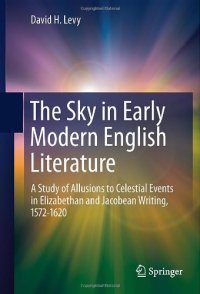
Ebook: The Sky in Early Modern English Literature: A Study of Allusions to Celestial Events in Elizabethan and Jacobean Writing, 1572-1620
Author: David H. Levy (auth.)
- Tags: Astronomy Observations and Techniques, Languages and Literature, Interdisciplinary Studies, History, Arts
- Year: 2011
- Publisher: Springer-Verlag New York
- Edition: 1
- Language: English
- pdf
When a dissertation gets completed, the normal rule is that it is never read. By anyone. David H. Levy’s dissertation - The Sky in Early Modern English Literature: A Study of Allusions to Celestial Events in Elizabethan and Jacobean Writing, 1572-1620 - is different. It opens a whole new interdisciplinary field, which involves the beautiful relationship between the night sky and the works of the early modern period of English Literature. Although the sky enters into much of literature through the ages, the period involving William Shakespeare and his colleagues is particularly rich.
When Shakespeare was about 8 years old, his father probably took him outside his Stratford home into their northward-facing back yard. There, father and son gazed upon the first great new star visible in the past 500 years, shining forth as brightly as Venus, and even visible in daylight. This new star, which we now know as a supernova, completely unhinged old ideas about the cosmos. Combined with a parade of bright comets, a second bright new star in 1604, and a series of eclipses, people began to look at the sky more seriously. In this book, Levy explores how the sky of that period was reflected in its literature.
Levy’s ultimate goal in this book is to inspire his readers to do the same thing as their ancestors did so long ago—look at the sky and appreciate how those long-gone authors read the sky.
Astronomy is not just a subject unto itself. We all look at the sky, and it has always been a fertile source of guidance and inspiration in art, music, and literature. This book explores the sky’s appearances in music and art, but focuses most on the sky’s enormous presence in early modern English literature. The author concentrates on William Shakespeare, whose references to the sky far exceed the combined total of all his contemporaries. Venturing into the historical context of these references, the book teaches about the Supernovae of 1572 and 1604, the abundant comets of this period, eclipses, astrology and its relation to the night sky at the time, and the early years of the telescope and how the literature of the time relates to it. This book promises to open doors between two great fields of study by inspiring readers to look for their own connections between astronomy and literature, and by helping them to enjoy the night sky itself more completely.